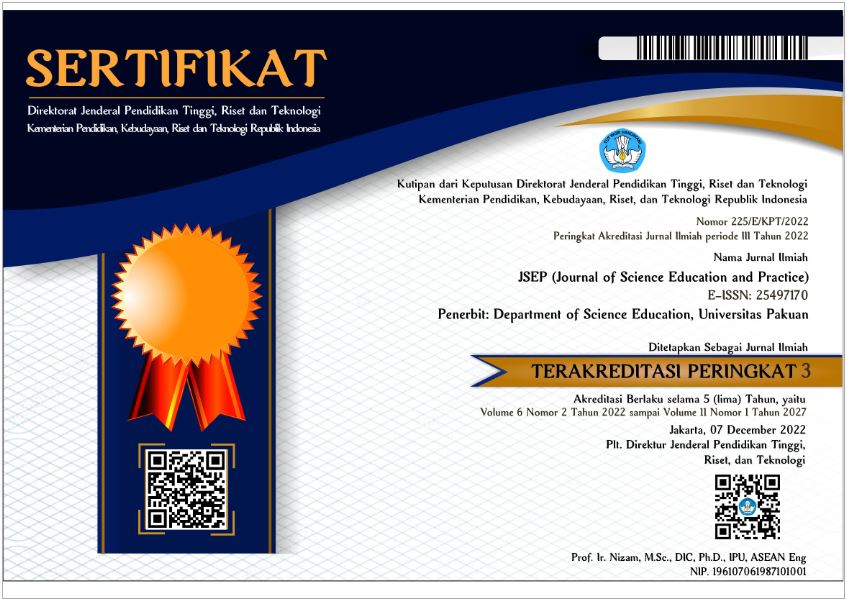ADDITIONAL MENU
Learning Science With Group Investigation And Guided Inquiry To Increase Biological Literacy In Coordination System Materials Of Class Science Xi Students
Abstract
Keywords
References
Anderson, LW, Krathwohl, DR, & Bloom, BS 2001. A Taxonomy for Learning, Teaching and Assesing . New York: Longman.
Arikunto. 2010. Basics of Educational Evaluation (Revised Edition). Jakarta: Earth Literacy.
Chebii R, Wachanga S & Kiboss J. 2012. Effects of Science Process Skills Mastery Learning Approach on Students' Acquisition of Selected Chemistry Practical Skills in School. Scientific Research . (http://www.SciRP.org/journal/
E. Abungu. H, Okere. MIO & W. Wachanga. S. 2014. The Effect of Science Process Skills Teaching Approach on Secondary School Students' Achievement in Chemistry in Nyando District, Kenya. Journal of Educational and Social Research MCSER Publishing, Rome-Italy . ISSN 2239-978X. ISSN 2240-0524.
Erniwati S. 2014. Application of Inquiry Learning to Improve Student Activity and Learning Outcomes on Respiration System material in Class VIII SMPN 1 Most Middle . Scientific Journal of Derap Pendidikan .
Espinosa. A , C. Monterola. SL & E. Punzalan. A. 2013. Career-Oriented Performance Tasks in Chemistry: Effects on Students' Integrated Science Process Sk . Cypriot Journal of Educational Sciences . 211-226 . http://www.awer-center.org/cjes/ .
Fraenkel, JR, et al. 2012. How to Design and Evaluate Receive In Education, 8 th Edition . New York: Mc. Graw-Hill
Hamalik O. 2008. Teaching and Learning Process . Jakarta: PT Bumi Aksara.
Hamalik O. 2010. Teaching Planning Based on a systems approach. Jakarta: PT Bumi Aksara
Kadir. 2015. Applied Statistics Concepts, Examples and Data Analysis with the SPSS/Lisrel Program in Research. Jakarta: Rajawali Press, 2015.
Ministry of Education and Culture. 2014. Natural Science Teacher's Book. Jakarta: Ministry of Education and culture.
M. Matthew B & Kenneth I. 2013. A Study On The Effects Of Guided Inquiry Teaching Method On Students Achievement In Logic . International researchers . Issue No. 1 March. 2013
Ongowo. RO & Indoshi . FC 2013. Science Process Skills in the Kenya Certificate of Secondary Education Biology Practical Examinations . Scientific Research . Published Online November 2013 in SciRes ( http://www.scirp.org/journal/ce
Minister of Education and Culture Number 58 of 2014 concerning the 2013 Curriculum for Junior High Schools/Madrasah Tsanawiyah
Safriani S. 2013. Application of Experience-Based Learning Model With Inquiry Approach on Light Materials to Improve Concept Mastery and Science Process Skills for Junior High School Students. Thesis. UPI Graduate School. Bandung.
Sanjaya W. 2006. Educational Process Standards Oriented Learning Strategy. Jakarta. Kencana 20.0.
Sayekti IC, Surwanto & Suparmi. 2012. Science Learning Using a Guided Inquiry Approach Through Experimental and Demonstration Methods From the Analytical Ability and Scientific Attitude of Students . Journal of Inquiry . http://jurnal.pasca.uns.ac.id. Downloaded January 25, 2016.
Sugiyono. 2013. Educational Research Methods Quantitative, Qualitative and R&D Approaches . Alfabeta, Bandung.
Sukarno, Anna. P, & Ida. H. 2013. Science Teacher Understanding to Science Process Skills and Implications for Science Learning at Junior High School (Case Study in Jambi) . International Journal of Science and Research (IJSR). India Online ISSN: 2319-7064. www.ijsr.net .
Ulpiyana A. 2014. Application of Inquiry Learning to Improve Concept Mastery and Students' Inquiry Ability on the Topic of Buffer Solution Properties . Research and Practice of Chemistry Education . .
DOI: 10.33751/jsep.v5i1.5690
 Abstract views : 368
Abstract views : 368
Refbacks
- There are currently no refbacks.
Copyright (c) 2022 JSEP (Journal of Science Education and Practice)

This work is licensed under a Creative Commons Attribution 4.0 International License.












